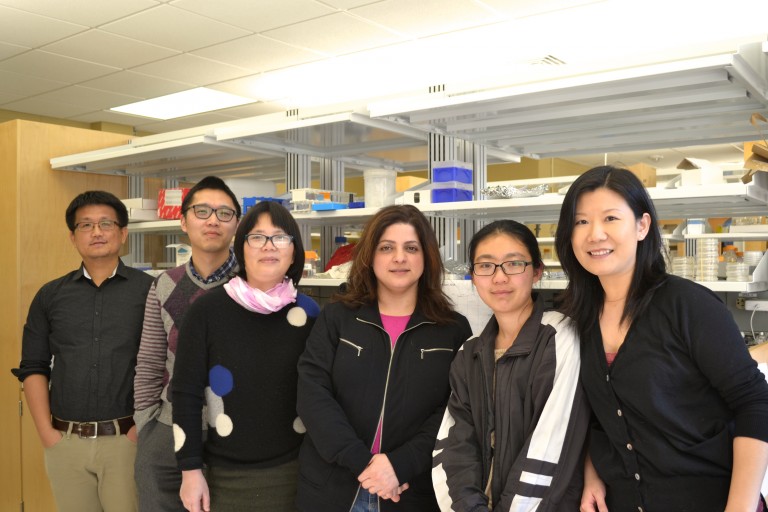Research
Our research focuses on understanding the molecular mechanisms underlying neural circuit formation during development and degeneration in aging. We use a free-living tiny roundworm, called Caenorhabditis elegans, as a model. The defined cell lineage, completely mapped connectome and rapid life cycle of this organism greatly facilitate investigating nervous system at the subcellular resolution. Combining classic genetic analysis with in vivo live imaging technique and molecular and cellular manipulations, we are discovering conserved mechanisms playing key roles in neural circuit formation, gap junction regulations and neurodegeneration.
Neural circuit formation: The development of C. elegans nervous system resembles some critical steps of mammalian cortex development. We use a simple motor neural circuit, RME circuit, as a model to investigate the conserved mechanisms of neural circuit formation. Four RME neurons are generated at the surface of embryos, and then migrate toward the center of embryos. After arriving at the pharynx region, RME left and right neurons adjust their positions to align four RME neurons with the same distance. RME neurons also undergo axon/dendrite development and synapse formation to build the connections between neurons. Through studying the RME circuit, we are uncovering novel mechanisms regulating neuronal migration, axon/dendrite differentiation and synapse elimination.
Neurodegeneration: Aging-related neurodegenerative diseases have become the hottest topics in the medical field. However, 99.6% of the drug development clinical trials for those diseases during the past decade have ended in failure. It seems that we need to rethink about the influential factors affecting the onset of these diseases. Aging, which is natural to all of us, is the most obvious one of them. However, it remains unclear what cause neurodegeneration during aging. We are using a sensitized genetic background to uncover negative and positive regulators of neurodegeneration.
Gap junction regulations: The nervous system is made by individual neurons connected by junction structures called synapses. There are two fundamentally different types of synapses: chemical synapses and electrical synapses (also called gap junctions). Through studies in different model organisms, we have gained rich knowledge of the development and regulation of chemical synapses. However, we still know little about how gap junctions are build during development, and what regulates the dynamic of gap junctions in functional circuits. We are investigating the molecular mechanisms underlying gap junction formation and regulations in C. elegans.
Biography
Dong Yan received his bachelor’s degree in Biology from Nankai University (Tianjin, China) in 2001. Following an interest in neuroscience, he then joined the Institute of Neuroscience (ION), the Chinese Academy of Sciences, as a graduate student. During his graduate training, he discovered the important role of AKT local degradation in the establishment and maintenance of neuronal polarity. As a postdoctoral fellow at the University of California, San Diego, he furthered his study of neural development and disorder in vivo using the genetic model organism C. elegans. Here, he demonstrated the essential role of a conserved MAP kinase pathway, the DLK-1 pathway, in axon regeneration and synapse regulation. Dr. Yan joined the MGM department at Duke University in September 2013. His lab focuses on addressing the molecular mechanisms undying neural circuit formation during development and neurodegeneration in aging.
Lab Members

Publications
Representative Publications:
Regulation of Glial Size by Eicosapentaenoic Acid through a Novel Golgi Apparatus Mechanism. Albert Zhang, Ziqiang Guan, Kyle Ockerman, Pengyuan Dong, Jiansheng Guo , Zhiping Wang , Dong Yan. (2020). PLOS Biology. 2020 Dec 28;18(12):e3001051. doi: 10.1371/journal.pbio.3001051.
NLR-1/CASPR anchors F-actin to promote gap junction formation. Lingfeng Meng, and Dong Yan. Developmental Cell . 2020 Nov 17;S1534-5807(20)30840-6. doi: 10.1016/j.devcel.2020.10.020.
Robo functions as an attractive cue for glial migration through SYG-1/Neph. Zhongwei Qu , Albert Zhang , and Dong Yan. elife. 2020 Nov 19;9:e57921. doi: 10.7554/eLife.57921.
Regulation of Gliogenesis by lin-32/Atoh1 in Caenorhabditis elegans. Albert Zhang, Ken Noma, Dong Yan. G3 (Bethesda). 2020 Jul 14:g3.401547.2020. doi: 10.1534/g3.120.401547. PMID: 32665354
Vitamin B12 Regulates Glial Migration and Synapse Formation through Isoform-Specific Control of PTP-3/LAR PRTP Expression. Albert Zhang, Brian D. Ackley, Dong Yan. Cell Reports. 2020 March 24. 30, 3981–3988
An Antimicrobial Peptide and Its Neuronal Receptor Regulate Dendrite Degeneration in Aging and Infections. E Lezi, Ting Zhou, Sehwon Koh, Marian Chuang, Ruchira Sharma, Nathalie Pujol, Andrew D Chisholm, Cagla Eroglu, Hiroaki Matsunami, Dong Yan. Neuron. 2018 Jan 3;97(1):125-138. PMID: 29301098 [EPub]
Lingfeng Meng, Albert Zhang, Yishi Jin, Dong Yan. Regulation of neuronal axon specification by glia-neuron gap junctions. elife. 2016 Oct 21;5. pii: e19510. doi: 10.7554/eLife.19510.
Lingfeng Meng, Chia-hui Chen, and Dong Yan. Regulation of gap junction turnover by UNC-44/ankyrin and UNC-33/CRMP through VAB-8 in C. elegans neurons. PLOS Genetics. 2016 Mar 25;12(3). PMCID:PMC4807823
Meng L, Mulcahy B, Cook SJ, Neubauer M, Wan A, Jin Y, Yan D. The cell death pathway regulates synapse elimination through cleavage of celsolin in Caenorhabditis elegans neurons. Cell Rep, 11:1737-48. 2015. PMCID: PMC4481169. [EPub]
Dong Yan and Yishi Jin. (2012). Regulation of DLK-1 kinase activity by calcium-mediated dissociation from an inhibitory isoform. Neuron, 76(3):534-48. PMID: 23141066.
Dong Yan, Kentaro Noma, Yishi Jin. (2011). Expanding views of presynaptic terminals: new findings from C. elegans. Current Opinion in Neurobiology, 22(3):431-7. PMID: 22036768.
Lizhen Chen, Zhiping Wang, Anindya Ghosh-Roy, Thomas Hubert, Dong Yan, Sean O’ Rourke, Bruce Bowerman, Zilu Wu, Yishi Jin, Andrew D. Chisholm. (2011). Axon regeneration pathways identified by systematic genetic screening in C. elegans. Neuron, 271(6): 1043-57. PMID: 21943602.
Gloriana Trujillo, Katsunori Nakata, Dong Yan, Ichi N.Maruyama and Yishi Jin. (2010). A Ubiquitin E2 Variant Protein Acts in Axon Termination and Synaptogenesis in Caenorhabditis elegans. Genetics, 186,135-145. PMCID:PMC2940282
Dong Yan, Zilu Wu, Andrew D. Chisholm and Yishi Jin. (2009). The DLK-1 kinase pathway promotes CEBP-1 mRNA stability and local translation in C. elegans synapse maintenance and axon regeneration. Cell, 138, 1005-1018. PMCID: PMC2772821
Hailan Yao, Kechun Zhou, Dong Yan, Mingtao Li and Yizheng Wang. (2009). The Kv2.1 channels mediate neuronal apoptosis induced by excitotoxicity. Journal of Neurochemistry, 108, 909-919.
Dong Yan†, Li Guo†, Yizheng Wang. (2006). Requirement of dendritic Akt degradation by ubiquitin proteasome system for neuronal polarity. The Journal of Cell Biology, 174(3), 415-24. PMCID: PMC2064237. †Co-first Author
Qiaoyun Yang†, Dong Yan†, Yizheng Wang. (2006). Intracellular K+ selectively regulates transcription factor DNA binding activities to control neuronal survival. Neuroreport, 17(11), 1199-204. †Co-first Author
Yanmei Tao†, Dong Yan†, Qiaoyun Yang, Rui Zeng, Yizheng Wang. (2006). Low K+ promotes NF- kB/DNA binding in neuronal apoptosis induced by K+ loss. Molecular and Cellular Biology, 26(3), 1038-50. PMCID: PMC1347023. † Co-first Author
For a complete list of publications, click here.


